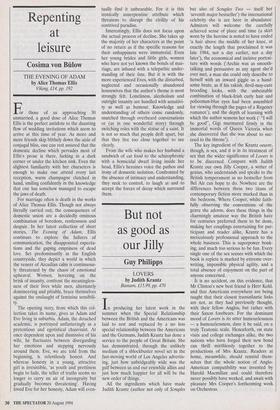But not as good as our Jill)/
Guy Philipps
LOVERS In producing her latest work in the summer when the Special Relationship between the British and the Americans was laid to rest and replaced by a no less special relationship between the Americans and the Germans, Judith Krantz has done a service to the people of Great Britain. She has demonstrated, through the unlikely medium of a shlockbuster novel set in the fast-moving world of Los Angeles advertis- ing, just how unbridgeably wide was the gulf between us and our erstwhile allies and just how much happier for all will be the new order of things.
All the ingredients which have made Judith Krantz (author not only of Scruples but also of Scruples Two — itself her `seventh major bestseller') the international celebrity she is are here in abundance. Admirers will welcome the carefully achieved sense of place and time (a skirt worn by the heroine is noted to have ended `a hair above the middle of her knee, at exactly the length that proclaimed it was late 1984, not a day earlier, not a day later'), the economical and incisive portrai- ture with words (`Archie was as smooth- talking and persuasive as any agent she'd ever met, a man she could only describe to herself with an inward giggle as a hand- some brute, as if his rakish, devil-may-care brooding looks, with the unbeatable combination of black-Irish curly hair and policeman-blue eyes had been assembled for viewing through the pages of a Regency romance'), and the depth of learning with which the author seasons her work (` "I will be good", Gigi murmured firmly in the immortal words of Queen Victoria when she discovered that she was about to suc- ceed to the throne').
The key ingredient of the Krantz oeuvre, though, is sex, and it is in its treatment of sex that the wider significance of Lovers is to be discerned. Compare with Judith Krantz our own Jilly Cooper, a writer of genius, who understands and speaks to the British temperament as no bestseller from Bel Air can hope to do. Nowhere are the differences between these two titans of contemporary fiction more marked than in the bedroom. Where Cooper, whilst faith- fully observing the conventions of the genre she adorns, does these things in the charmingly amateur way the British have for centuries preferred them to be done, making her couplings entertaining for par- ticipant and reader alike, Krantz has a meticulously professional approach to the whole business. This is superpower honk- ing, and much too serious to be fun. Every single one of the sex scenes with which the book is replete is marked by extreme over- writing, impossible physical agility, and a total absence of enjoyment on the part of anyone concerned.
It is no accident, on this evidence, that Mr Clinton's new best friend is Herr Kohl, and that Americans everywhere are being taught that their closest transatlantic links are not, as they had previously thought, with their fellow Anglos, but rather with their Saxon forebears. For the dominant mood of Lovers is its utter humourlessness — a humourlessness, dare it be said, on a truly Teutonic scale. Henceforth, on state visits and college exchanges alike, the two nations who have forged their new bond can thrill mirthlessly together to the productions of Mrs Krantz. Readers at home, meanwhile, should remind them- selves that the whole notion of Anglo- American compatibility was invented by Harold Macmillan and could therefore never possibly have worked, and await with pleasure Mrs Cooper's forthcoming work on Orchestras.


















































 Previous page
Previous page